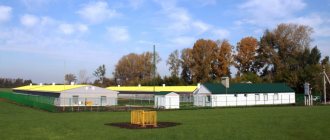Hello! Today we’ll talk about subsidies and grants for agriculture in 2020.
In connection with the sanctions rhetoric against our state, serious measures are being taken that are aimed at developing and improving the level of agriculture. This year the state plans to allocate an even larger amount of funds for this industry.
Types of grants for agriculture
Grant programs allow farmers and farm owners to reach a new level of development and build a farm that will be economically successful.
Now let’s look at what kind of grants there are:
- Grants allocated for communications at agricultural enterprises, for the acquisition of land, for the construction of various facilities in agriculture;
- Subsidizing measures to modernize the economy;
- Subsidizing for repayment of lease payments;
- Partial compensation of funds spent on construction work on the construction of production facilities;
- Grants for the purchase of farm animals;
- Compensation for funds spent on fertilizers.
In general, there are 2 options for providing support to the agricultural sector. Grants that the government provides to beginning farmers and family farmers.
A beginning farmer who meets certain criteria, which will be discussed below, can apply for such a grant.
Subsidizing of subsidiary farming
State registration of a peasant farm or individual entrepreneurship is not a necessary condition for participation in assistance programs, since anyone engaged in personal farming can become a farmer from scratch in Russia and attract free financing.
Subsidizing cattle maintenance
To stimulate the production of meat and dairy products, the state provides the owner of a private household plot containing cattle with compensation in the amount of 3,000 rubles per animal per year (in the amount of no more than 30,000 rubles). You can get help if:
- There are at least three cows on the farm;
- All animals are identified and tagged or microchipped.
The basis for providing such assistance to beginning farmers 2020 is provided to local governments:
- Statement;
- Certificate of calculation for reimbursement of expenses;
- Extract on the availability of rights to the plot from the household register;
- Register of identified cattle.
Video on the topic
Subsidizing technical modernization
The next type of assistance to beginning farmers working within private household plots is reimbursement of expenses for technical re-equipment or modernization of the farm. Citizens who keep at least three cows or ten conventional heads of livestock can receive subsidies in the amount of 150,000 rubles per year. The list of documents required for the allocation of funds includes:
- Statement;
- Certificate of calculation for reimbursement of costs;
- An extract on the availability of rights to the plot from the household register;
- Copies certified by the owner of the private household plot:
- Contracts for the purchase of equipment, units or construction materials;
- Acts of acceptance and transfer of equipment, units or structural materials;
- Contracts and certificates of completed work;
- Checks and receipts confirming payments;
- For vehicles - PTS with registration record.
What assistance are available to beginning farmers in this case? The subsidy is calculated on the basis of co-financing in the following ratio:
- When purchasing milking machines, equipment for pasteurization and cooling of milk, meat processing machines, equipping slaughter places - up to 50% of expenses;
- When purchasing agricultural machinery and tractors - up to 30%;
- When purchasing passenger car trailers and small trucks - up to 20%;
- When installing water supply wells and connecting to power lines - up to 70%.
Subsidizing the cost of slaughtering livestock
The owner of a private household plot raising livestock for meat can count on this type of assistance for beginning farmers in 2020, such as compensation for the cost of slaughtering the herd. Funds from the budget are allocated in the amount of up to 1000 rubles per head, subject to the provision of the following documents:
- Statements;
- Certificates of calculation for reimbursement of costs;
- Extracts on the availability of rights to the plot from the household register;
- Copies certified by the owner of the private household plot:
- Agreements with a meat processing plant or private entrepreneur for the slaughter of livestock;
- Certificates of completed work;
- Checks and receipts confirming payments.
Criteria for professional assessment
- The professionalism of a farmer who applies for an agricultural development grant. This criterion is met by: farmers with higher education (preferably specialized), with recommendations from local authorities;
- Having a well-written business plan, which includes: formulated goals for the future, ways to achieve them, resources used, and the end result.
- Availability of start-up capital;
- Availability of objects to achieve the set goals;
- Plans for the sale of finished products.
The final criterion for evaluation is the following: how significant the proposed project is for society.
Taking into account all the above criteria, the commission selects the most worthy participant in the competition.
How is the grant issued?
To receive government assistance, you need to check your compliance with the conditions relating to the issuance of subsidies to farmers. If an individual, individual entrepreneur or peasant farm does not meet these criteria (or even one of them), the issuance of funds will be impossible.
Educational and scientific organizations working in the field of agriculture can also apply for assistance. In addition, this right is reserved for agricultural producers and agricultural consumer cooperatives. Thus, the possibility of providing funds to everyone who potentially benefits the internal market is declared.
Main requirements for the applicant
There are not very many requirements, but they also seriously limit the circle of applicants for subsidies. Key ones relate to:
Professional level. Farmers with higher education or 10 years of experience in this field have a higher chance of receiving government assistance. However, both facts must be documented. Thus, having experience allows you to apply for a grant even in the absence of specialized education.- Own money to run a business. In this case, it is allowed not to have the entire amount on hand. The minimum threshold is 30% of the required funds. This parameter is determined by regional authorities.
- High-quality business plan preparation. Without such a plan, you should not count on the allocation of funds, since the commission must receive convincing data that the developed business will benefit the region’s agriculture.
- Availability of land resources and production assets for the initial level of agricultural activity. This means that the farmer must have the minimum required plot of land with buildings.
- Prospects for sales of manufactured products. It is necessary to create a clear plan that outlines the places for marketing or selling the results of the agricultural enterprise.
- Creation of jobs. A farmer applying for a grant must create at least one permanent job in the agricultural sector.
If you do not meet at least one parameter, you can apply for government assistance after eliminating the deficiency. But if this concerns the lack of professional experience, then a grant to a beginning farmer can be approved with the consent of the municipality. Representatives of the authorities must give written recommendations to a farmer developing agriculture in a certain area.
Conditions for receiving funds
It is important to note that there is also a list of conditions under which it is possible for a beginning farmer to receive funds as government assistance. They differ in different regions, but the general content is approximately the same. For example, an applicant for a subsidy must:
- be a citizen of the Russian Federation;
- have experience in the agricultural sector at an established level (usually 2 years or more);
- apply for government assistance in your field for the first time;
- live in the area where the farm is planned to be located.
Even work experience in non-managerial positions is counted as length of service. For example, a person can be a combine operator and then apply for help in creating his own business.
Competition procedure
Applications are considered by a special commission under the Ministry of Agriculture in a specific region. It is there that the decision is made to allocate a subsidy or refuse assistance. The selection is made on a competitive basis between all applicants. The winner is the farmer who will be most useful to society and meets all the stated requirements and conditions. If a farmer receives a refusal in one direction, this does not relieve him of the right to apply for a grant in another.
Thus, you can always apply for several areas. A candidate has the right to submit applications in several areas at once, and members of the commission will decide how much his capabilities correspond to the interests of society.
Required Documentation
To receive a subsidy, a beginning farmer must provide the commission with a package of documentation to confirm his compliance with the stated requirements. The specific list is approved at the regional level and usually changes depending on the purpose of the farm subsidy.
The basis of the package of documents consists of:
- a completed application in person;
- copy of education diploma;
- certificate of registration of a farm enterprise, tax registration (this is carried out within 14 calendar days after registration);
- a copy of all completed pages of the civil passport;
- a detailed business plan (this can also be done by third-party specialists);
- written agreement for the processing and storage of personal data;
- recommendations from municipal authorities (optional);
- a signed agreement for the supply of farm products.
The applicant may not be allowed to participate in the competition if there are no documents on at least one point. Therefore, his application will not be accepted. But there is always the opportunity to resubmit your application so that it will be selected next time. And the number of such attempts is not limited, since agricultural development is considered a priority for the regions.
Grant procedure
To bring all the ideas of a novice farmer to life, in any case, a certain amount of money is required, without which you can’t go anywhere. The only problem is that not everyone has these funds, and not everyone knows how to earn money. It is in such cases that the state is ready to provide assistance in the form of a grant for the development of farming.
A grant is a type of financial assistance that does not need to be repaid, but those who receive it must provide reporting for the funds spent.
To receive this help, you need to complete several tasks. Therefore, we will dwell on some of the subtleties and nuances of the procedure for obtaining support from the state.
First of all, it is worth considering that the proposed project should be of interest to the members of the expert commission. This needs to be reviewed before submitting your application.
You cannot spend the money received as a grant at your discretion: you will need to account for it.
Now let's look at what documents are needed to successfully submit an application:
- Completed application form;
- Photocopy of an identity document;
- Photocopy of diploma;
- Business plan;
- Correctly completed application form;
- Recommendations;
- Consent for the processing of personal data;
- Copies of the Charter;
- A certificate confirming that the applicant is indeed a small business.
If the commission requires a number of other documents, they will need to be provided.
The entire grant amount is not given out in full; the transfer occurs in installments.
If a farmer receives a grant for agricultural development, he will also need to pay taxes after receiving each tranche. Another important point: if the purpose of obtaining funds is any equipment, then it will be provided to the entrepreneur, and not financial resources for the purchase.
Regarding grants for creating a farm, it is worth saying that they can be obtained not only from Russian investors, but also from foreign ones. Therefore, before submitting an application, you should clarify who exactly the investor is, since their requirements differ significantly from each other.
Having studied these requirements in advance, you can adjust your business plan in accordance with their requests. For example, the targeted use of funds received is especially important for investors from other countries, while domestic sponsors are more interested in the number of potential jobs that will be created if the project is implemented.
If we talk about receiving a grant for the development of peasant farms and farming enterprises, preference is given to those individuals who are ready not only to ask for money from the state, but also to contribute their own funds to the development of the business.
First sowing
Until 2020, grants aimed at beginning farmers were provided only to existing farms.
But thanks to the national project “Small and Medium Enterprises and Support for Entrepreneurial Initiatives,” an opportunity has arisen to help village residents who are just planning their first agricultural project. They can take part in a competition for future farmers and win a grant of up to 3-4 million rubles. Competitions under the general name “Agrostartup” are organized by regional ministries of agriculture. There are three main conditions for participation: be ready to register a peasant farm within 15 days after winning, invest at least 10% of your own funds in the project and create at least one job.
The grant can be spent for 18 months on solving the main problems associated with starting a business: purchasing land, agricultural machinery, equipment, animals, seeds, building a farm, warehouse, road, water supply or other communications.
Lean Farms. How do business consultants help cows milk better? More details
20-year-old Ivan Parkaev from the village of Aleksandrovka, Ulyanovsk region, purchased two new Belarus tractors, a seeder, a sprayer with a grant, and hired three tractor drivers - young fellow villagers who decided to return from the city. “In crop production, a machine operator now has a higher salary than an ordinary factory worker,” says Ivan. “And since I have new equipment, it was not difficult to find people willing to switch to it.” The first sowing, according to Parkaev, went well, without missing deadlines and exceeding the original plan. 198 hectares were sown with wheat and barley instead of 60. A good supply of equipment made it possible to rent additional land shares.
In total, Ivan Parkaev received 4 million rubles as a grant. But he donated part of the money to the fund of the Aleksandrovsk cooperative “Invest-Povolzhye” , which he joined following the example of his older brothers, also farmers. This is another one of the conditions of the Agrostartup competition: the winner receives the maximum possible amount if he plans to join one of the agricultural cooperatives and make a contribution to it. “It’s easier to work together,” Ivan is sure. “And it’s easier to sell crops through a cooperative, and there’s always someone to ask for advice.”
20-year-old Ivan Parkaev is one of the youngest Ulyanovsk farmers. Photo: Photo from the archive of Ivan Parkaev
The advice of his older brothers also helped him win at Agrostartup. Alexander and Maxim Parkaev also received grants from the state under the Beginning Farmer program. Their experience helped Ivan prepare for the competition and beat other applicants. “My competition documents were in almost perfect order, my desire to work was very strong. And I convinced the regional Ministry of Agriculture that I would be able to effectively manage the money received,” recalls Ivan.
In total, in 2020, future Ulyanovsk farmers submitted 96 applications to the Agrostartup competition, and the regional commission identified 22 winners, giving them grants worth 75.3 million rubles.
How to get a grant from private investors
A beginning farmer can apply for a grant not only from the state, but also from a private foundation. Typically, such funds provide funding to the grantee in stages. If the first amounts are disbursed successfully and the reporting for their use does not contain violations, the next part of the funds is paid.
An important point when approaching private investors is that small projects are unlikely to interest them. But if you think globally and can justify your plans, it is quite possible that they will be interested in you and provide the necessary financial support.
Grant size for a beginning farmer in 2020.
The size of the grant for a beginning farmer depends on the direction of the farm's activity.
The head of a farm may be provided with a grant of up to 5 million rubles if the farm specializes in breeding cattle for meat or dairy purposes.
For other types of agricultural activities, the grant size cannot exceed 3 million rubles.
Project of a family dairy farm for 25 cows with tether housing, milking into a milk pipeline, manure removal with a scraper conveyor.
Recommendations for applicants
Taking as a basis the experience of people who have already participated in the competition for grants, we can give some practical recommendations to those who are just planning to try to receive government support.
- Each region has its own specific aspects of the competition. This needs to be taken into account and such information clarified in advance in order to be fully prepared;
- You need to register with the Federal Tax Service only after a detailed study of all documents about the competition. Otherwise, there is a risk of not being allowed to see him.
- Take into account the validity periods of all certificates so that you do not have to collect them again;
- Take your business plan seriously. The commission studies this document especially carefully;
- Study all the conditions for granting a grant in your region of residence;
- Strictly adhere to deadlines for submitting reporting documents.
Farm business plan
The desire of the state to control the spending of funds allocated to private entrepreneurs as assistance seems completely logical.
Therefore, each applicant for a grant or subsidy must submit a business plan to the commission distributing budget funds - a detailed guide to the implementation of the project. The format of this document for participation in the competition for funding differs slightly from standard samples published on the Internet: here the emphasis is on commitments to achieve certain performance indicators, subsidy goals and expected social benefits. Thus, a business plan recommended for farmers should contain the following sections: Project summary. This chapter briefly mentions information such as:
- Name and goals of the project;
- Characteristics of the farm;
- Stage of business existence (creation of a new project or development of an already operating enterprise);
- The required volume and expected sources of financing, the amount of previously attracted investments.
Description of the applicant. This section of the business plan for a peasant farm contains a description of the present and expected objectives of the enterprise:
- Peasant farm profile, current activities;
- Goals to be achieved by the project;
- Property and equipment that is already available.
Description of products. Here you need to mention the main characteristics of the product:
- Functional purpose and problems that it solves;
- Market value;
- Directions for further development of the product and production itself.
Social significance. In this section, it is necessary to mention the reasons why material assistance to the farmer will help improve the social situation in society:
- The number of new jobs required for the implementation of the project;
- Expected increase in employee salaries.
Production plan. This chapter should describe in detail the technological process of product production, namely:
- Existing or new technology that will be used during the project implementation;
- Activities aimed at production control;
- Requirements for raw materials, feed, materials, as well as conditions for their supply;
- List of sanitary and anti-epizootic measures.
Organizational plan. Within the framework of this section it is necessary to consider:
- Schedule plan for project implementation with reference to intermediate indicators - for example, production volume or livestock growth;
- Plan for spending funds, including assistance to a beginning farmer from the state in 2020.
Marketing plan. Here you need to analyze the sales market and justify the possibility of achieving success by considering issues such as:
- Investment attractiveness of the industry;
- General and regional market capacity;
- Availability of enterprises engaged in the production of analogues;
- Sales strategy - direct sales through a dealer network, working with wholesale resellers, organizing branches.
Financial plan. In this section, you need to develop a financial model of the project at all stages of its implementation, including:
- Profitability and profitability forecast;
- Requirement for funds, financing schemes;
- Variable and fixed costs;
- Calculation of production costs;
- Tax schemes and amounts.
Project results. This chapter examines interim indicators broken down by year and the final result of the project:
- Increase in production, increase in livestock, achievement of the planned level of profitability;
- Number of existing and new jobs, salary.
A business plan for a beginning farmer to receive a grant is drawn up for the entire period of validity of the agreement between the applicant and the institution allocating the funds. For programs to subsidize the development of peasant farms and family livestock farms, the planning horizon is five years.
Responsibility for misuse of a grant
If during the proceedings it is proven that the recipient of the grant did not plan to use it for its intended purpose, but only received and appropriated these funds, or did not report for them within the established time frame, this act may be qualified under the article “Fraud.”
Also, such an offense may be classified under the article “Misuse of budget funds,” which already entails criminal liability.
What would you like to say to conclude today's conversation? If a farmer receives a grant, many people benefit: residents of a particular area will buy products from a local manufacturer, the farmer will receive a profit, and therefore the opportunity to expand his business.
What is the benefit of the state? The fewer imported agricultural products are sold in our country, the less external influence will be exerted on it. But this story is from a different area.
What happens if you use the products for other purposes?
The decision to appropriate funds received for the transformation of a mini-farm or to spend them for purposes other than those indicated in the application is regarded as fraud or misuse of budget funds. Using budget funds inappropriately entails criminal liability.
To avoid “temptations” in the form of a large sum of money received by the applicant, a loan for private household plots is issued in installments. You are required to account for each portion received. The report should describe in detail the items of expenditure and draw parallels with the stated tasks and goals.
Another way to combat misuse is to provide material assistance not with finances, but with equipment, fertilizers, and building materials on which the farmer planned to spend the capital received.
Recommendations to applicants for subsidies from experienced entrepreneurs of Tatarstan, Vologda region, Krasnodar region:
| № | Factor to consider | Causes |
| 1. | Regional affiliation | Each region has its own specifics for conducting a competitive selection of applicants, based on its economic, social and other characteristics. Please consider this factor when submitting your application. |
| 2. | Validity period of certificates | Pay attention to the correspondence of the deadlines for the certificates with the deadlines for submitting documents, so as not to appear incompetent to the commission. |
| 3. | Correctness of documents | The commission carefully studies the documents. Prepare them in advance and be sure to double-check them. |
| 4. | Conditions for providing assistance in the region | The procedure for calculating assistance is different in each region. Specify the timing, amount of amounts, nature of material assistance (money, equipment). |
| 5. | Keep track of reporting deadlines | Do not forget to report on the expenditure of funds on time so that you are not accused of misusing them. |
To conclude the topic, there is a video about the real experience of receiving financial assistance for the development of peasant farms:
How to create a farm and receive government support
11 subroutines. They provide a variety of forms of support: preferential lending, coverage of losses, costs of land registration, purchase of equipment, gasification, restoration of irrigation systems, and so on. Their implementation is carried out by the Ministry of Agriculture and the Association of Peasant Farmers (AKKOR). Detailed information can be found on the official websites.
We recommend reading: Federal Tax Service State Duty for Closing a Sole Proprietorship in 2020 Details
It should be noted right away that the legal status of peasant farms is characterized by duality. Since 1990, they have been created in the form of legal entities, and since 1994 - as individual entrepreneurs without forming a legal entity. In 2003, Law No. 74-FZ “On Peasant (Farm) Economy” was adopted, where it is defined as a family-related association of citizens by agreement. However, since 2012, such a voluntary entity has the right to create a legal entity - peasant farm enterprise-legal entity.
List of papers for participation in the state program
Receiving a grant for agricultural development involves collecting and submitting a package of papers to the appropriate authorities, such as:
- completed application for participation in the state program;
- identification document and its copy;
- diploma of higher (secondary, specialized secondary) education and its copy;
- work book and its copy (to confirm experience in agriculture);
- business plan;
- estimate;
- application form for a grant applicant;
- recommendations and other applications (if available);
- a certificate confirming the presence in the applicant’s bank account of an amount equal to at least 10% of the grant;
- consent to the processing of the applicant’s personal data;
- a certificate confirming that the applicant is a small business entity (entrepreneur).
The list of documents may vary depending on the requirements of committees in different constituent entities of the Russian Federation, so it is worth checking the data with the local coordinator of the state program.
Purposes of using state aid
You won’t be able to spend government aid on your own needs, since you have to report on the expenses. With a grant for farm development, the recipient of funds can purchase:
- farm animals;
- seeds and planting material for perennial plants;
- fertilizers and chemicals;
- equipment and agricultural machinery;
- buildings, warehouses, premises, structures and land plots;
- engineering networks that are necessary for the production of agricultural products.











